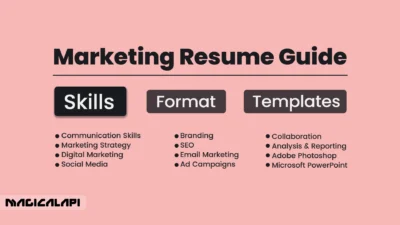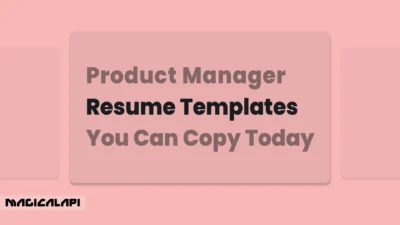Project manager resume: Securing an interview for a project manager position in today’s competitive job market means more than just having the experience; it means writing a powerful project manager resume that markets your skills, achievements, and value.
If you’re wondering how to write a document that gets you past the first screening (which often isn’t a human!), and instead captures the attention of hiring managers, you’re in the right place. In this resource, we outline best practices for resume writing, summarize skills required for project manager roles, and provide many project manager resume examples that will assist with your own product.
Writing a resume is the first essential step in your job search. You should think of it as a marketing document that will result in the interview you want. We are going to show you how to make yours great.
Table of Contents
Crafting Your Project Manager Resume: Best Practices
To create a winning project manager resume, the first step is knowing what recruiters and hiring managers want. A resume is much more than a list of all the jobs you’ve ever had; it is a representation of your ability to successfully get projects delivered.
- Focus on Results, Not Responsibilities – When constructing your resume, show measured results and accomplishments instead of merely listing things you were responsible for. For example. instead of simply stating “diet you were responsible for managing project budgets” you could emphasize that you “successfully managed project budgets in excess of $2M, while consistently delivering projects 10% under budget.”
- Use Action Verbs – Start all your bullet points with strong action verbs that demonstrate leadership and accomplishment (e.g., Led, Managed, Implemented, Developed, Optimized).
- Tailor to the Job Description – Although this guide provides general suggestions, you must always tailor your resume to the requirements of the specific job to which you are applying. You can show your most relevant skills and experience by clearly demonstrating the relevancy of your background to the position. In order to understand What Is a Resume? in its highest state of effectiveness, you need to see it as a targeted document.
Must-Have Sections for Every Project Manager Resume
A well-designed resume will allow hiring managers to quickly find the relevant information. These are the main sections to include:
- Contact Information: Your full name, phone number, professional email address, LinkedIn profile URL
- Project Manager Summary or Objective:
- Project Manager Resume Summary: 2-4 sentence overview of your career experience, skills, and career goals. This format is helpful for experienced project managers.
- Resume Objective: More aligned to candidates just starting their career, or changing their career. This reflects your hopes for new position and how you can help the organization.
- Experience: List your work experience, and responsibilities and accomplishments in reverse chronological order. For each one, include the employer name, title, time worked and bullet points highlighting your accomplishments and responsibilities. This is where you will included real project manager resume examples from your career.
- Skills: a standalone section for your technical and soft skills. We will discuss essential project management skills in more detail later.
- Education: list your degrees, institutions attended, and graduation dates.
- Certifications (Optional but Familiar): Include certifications to further establish credibility in project management such as: PMP (Project Management Professional), PRINCE2, Agile certifications (CSM, PMI-ACP etc).etc will enhance your credibility.
You might also want to check out a Resume Score tool to assess how well your sections below are constructed and if essential pieces of information are missing from your resume.
Magical Resume Score
Discover everything you need to know about Magical Resume Score , how it evaluates your resume, and the various options available to enhance your job application and improve your chances of success.
Showcasing Your Impact: Quantifiable Achievements
One of the most important best practices to follow with a project manager resume is to highlight your metrics-based accomplishments. Numbers tell a story, and more importantly, they provide evidence of what you can do. Rather than stating “Improved team efficiency,” say “Implemented a new agile workflow that increased team productivity by 15% within six months.”
Consider metrics relating to:
- Budget: Savings, budget managed, variance.
- Time: On-time or early project completions, reduction of project delays.
- Scope: Successful management of scope changes, delivery of all project scope deliverables.
- Team: The size of the team managed, improvement of team performance/satisfaction.
- Quality: Reduction of errors, rise in client satisfaction scores.
- Risk Management: Successful identification and mitigation of critical risks.
All of these metrics will enhance your resume from a passive performance of duties to an active demonstration of your contributions.
Read More: How to name resume file
Key Project Management Skills to Highlight
Your resume should accurately communicate your project management skills. You can think of project management skills as hard skills (technical skills) and soft skills (interpersonal skills).
Hard Skills:
- Project Planning & Scheduling
- Prerequisites
- Budget
- Risk
- Agile & Scrum
- Waterfall
- Project Management Software (for example: Jira, Asana, MS Project, Trello)
- Stakeholder Management
- Change Management
- Quality Assurance
- Reporting & Documentation
Soft Skills:
- Leadership
- Communication (written and verbal)
- Problem Solving
- Negotiation
- Conflict Resolution
- Teamwork and Collaboration
- Time Management
- Adaptability / Flexibility
- Critical Thinking
- Decision Making
Once you have documented each of these skills, you will want to spread them throughout your experience section and show how they were applied in your various experiences.
Formatting Tips to Make Your Resume Stand Out
The look of your résumé matters just as much as the information it contains. You can have a strong résumé, but if it is cluttered or poorly organized, the reader may not even take a look after first impressions.
- Keep it Short: If you have less than 10 years of experience, just aim for one page. Seasoned professionals should not go over two pages.
- Use a Professional Font Style: Select only clean and readable fonts, such as Calibri, Arial, Helvetica, or Times New Roman. The point size should be from 10-12pt.
- Leverage White Space: White space has a purpose. Just be careful that you do not jam too much content into the space allotted. Having sufficient white space improves readability.
- Keep Formatting Consistent: Be consistent with font sizes, bullet point styles, and date formats during the entirety of your résumé.
- Use Bullet Points: Bullet points create space between accomplishments while easing scanning and scanning readability.
- Save your Document as a PDF: This will save your formatting across devices and calendars of operating systems. Different companies will use Applicant Tracking Systems (ATS). If you want to learn how to prepare your résumé for ATS, you can check Understanding What is Resume Parsing?. Saving your résumé as PDF is a choice based on the idea that you are not going to mess this up.
Leveraging Keywords: Getting Past Applicant Tracking Systems (ATS)
Lots of companies have Applicant Tracking Systems (ATS) that screen all resumes before they even reach a human being. ATS will search for keywords that match up to the actual job description.
- Analyze the Job Description: Read the job listing carefully and pay attention to the keywords by which skills and experience and qualifications the employer is seeking.
- Use the Keywords Naturally: Place these keywords throughout your resume, especially in the skills section, and when describing your experience. Don’t ‘stuff’ keywords, they must be used in context and used naturally.
- Use Common Jargon: Do not get cute, use the common terms the industry uses for your roles and responsibilities.
If you follow the steps above your resume will be much more optimized and you will have a much better chance of passing the ATS scan. You can also use a Resume checker to know how well your resume may be optimized.
Magical Resume Checker
Discover the full potential of the Magical Resume Checker and explore the various options available to enhance your resume, optimize it for applicant tracking systems (ATS), and improve your chances of landing your dream job.
10 Proven Project Manager Resume Examples That Land Interviews
Experiencing the theory is often the best course of action. To fully comprehend what a good project manager resume looks like, and to get past just illustrations, we’ve developed 10 unique, detailed project manager resume examples. Each of these full resume samples is specific to the project management role in technology, construction, marketing, and healthcare for various experiences. They show exactly how to effectively tell your story of skills, experience, and metrics of your accomplishments.
These full resume examples will help you better visualize how to frame your experiences and help you arrange your resume for effective use, and are meant to provide a clear template that works in landing interviews. Let’s delve into the detailed examples.
1. IT Project Manager
“I directed a project team of 12 engineers on the successful migration of obsolete systems to a cloud-based architecture. The project ended two weeks early and 8% under budget, resulting in the systems being 20% improved.”
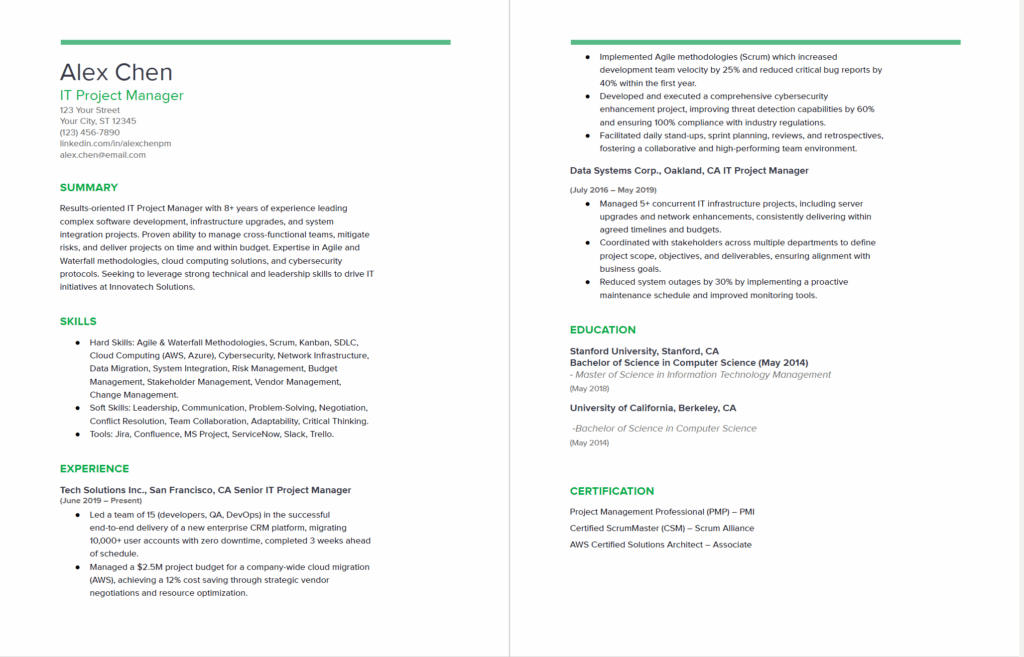
2. Construction Project Manager
“I managed all aspects of a commercial building project worth $5M, from conception to completion. I ensured compliance with health and safety regulations throughout the process. Even with weather delays I successfully delivered the project on schedule, thanks to a solid risk management plan.”
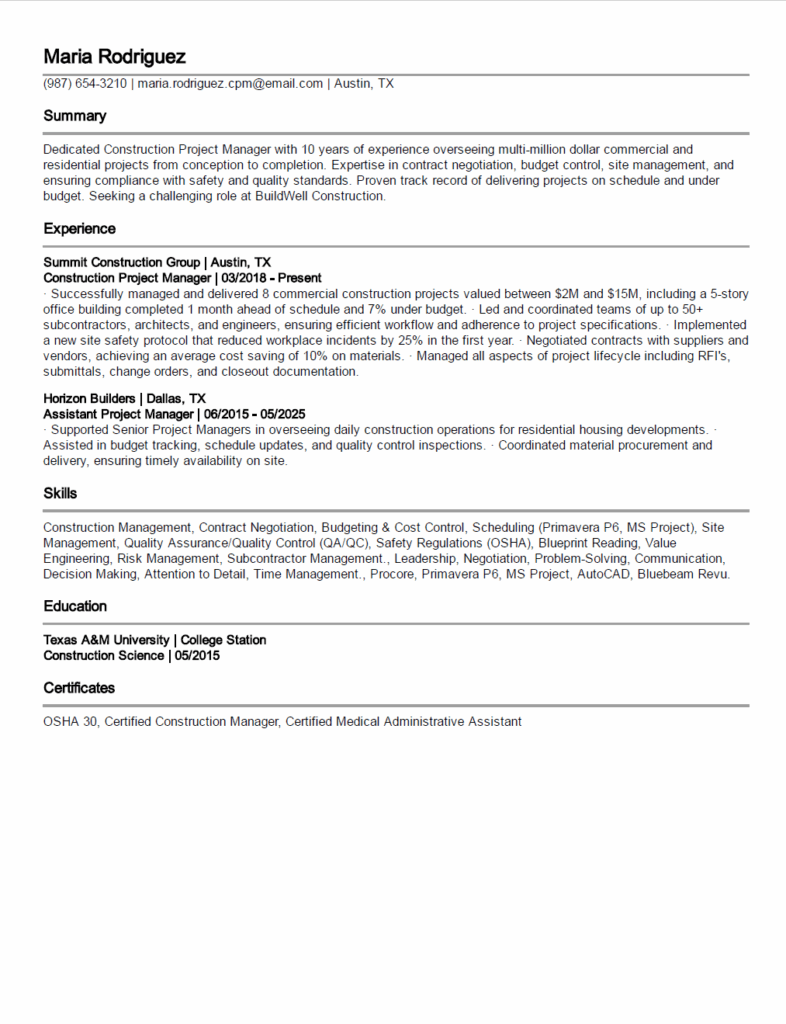
3. Marketing Project Manager
“Oversaw the implementation of 3 new product marketing campaigns, collaborating with cross-functional teams (creative, content, sales), achieving a 25% increase in qualified leads generated and a 15% increase in product adoption in the first quarter.”
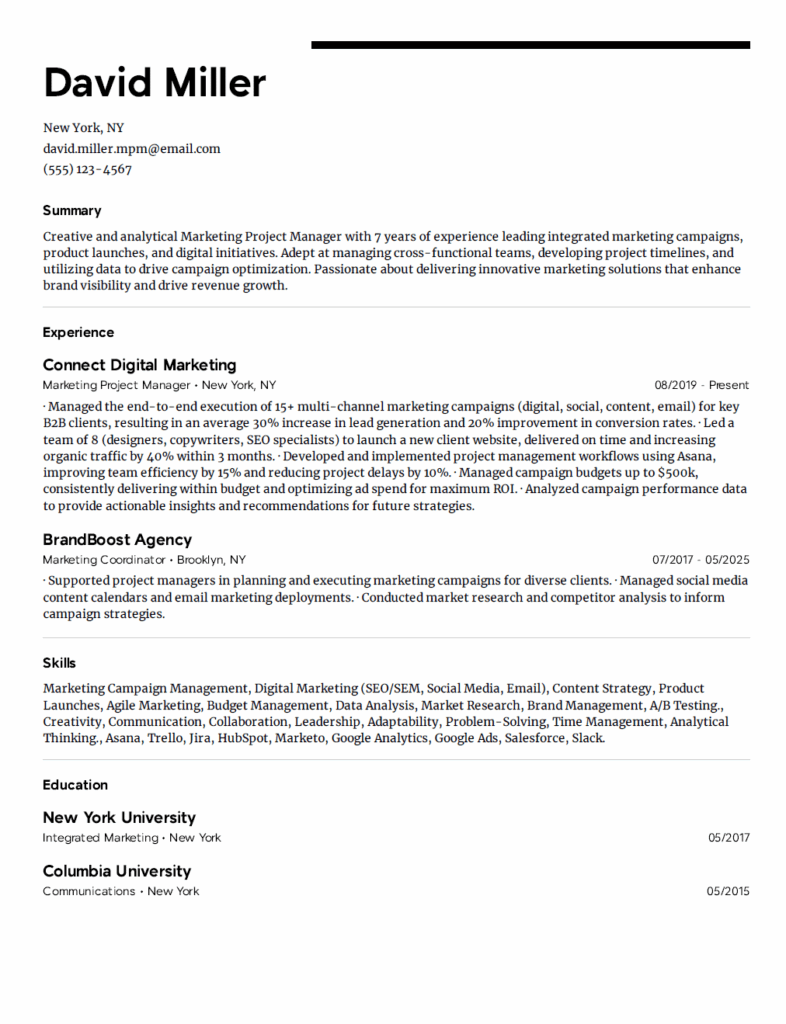
4. Healthcare Project Manager
“Launched a new Electronic Health Record (EHR) system across a network of 5 clinics and trained 100+ staff members while ensuring 99% data accuracy and a seamless transition resulting in 18% improvement in patient processing time.”
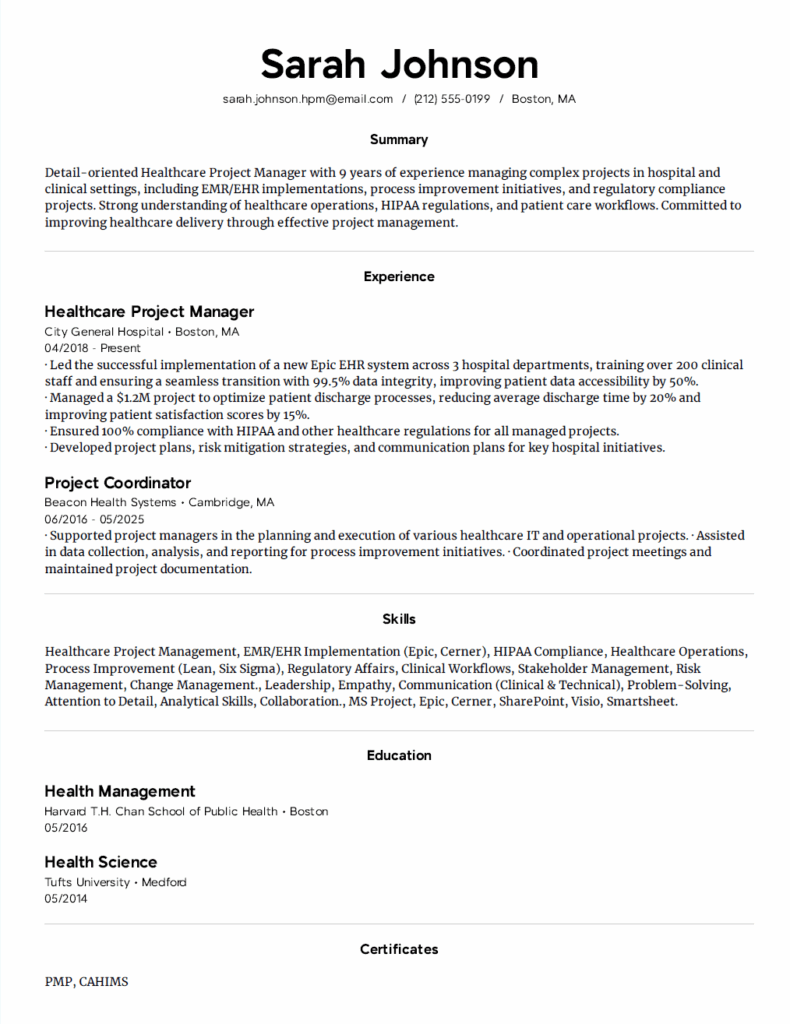
5. Agile Project Manager/ Scrum master
“Conducted daily stand-ups, sprint planning and retrospectives for a software development team of 8 – which resulted in a 30% increase in development velocity and a 20% decrease in bug reports post release.”
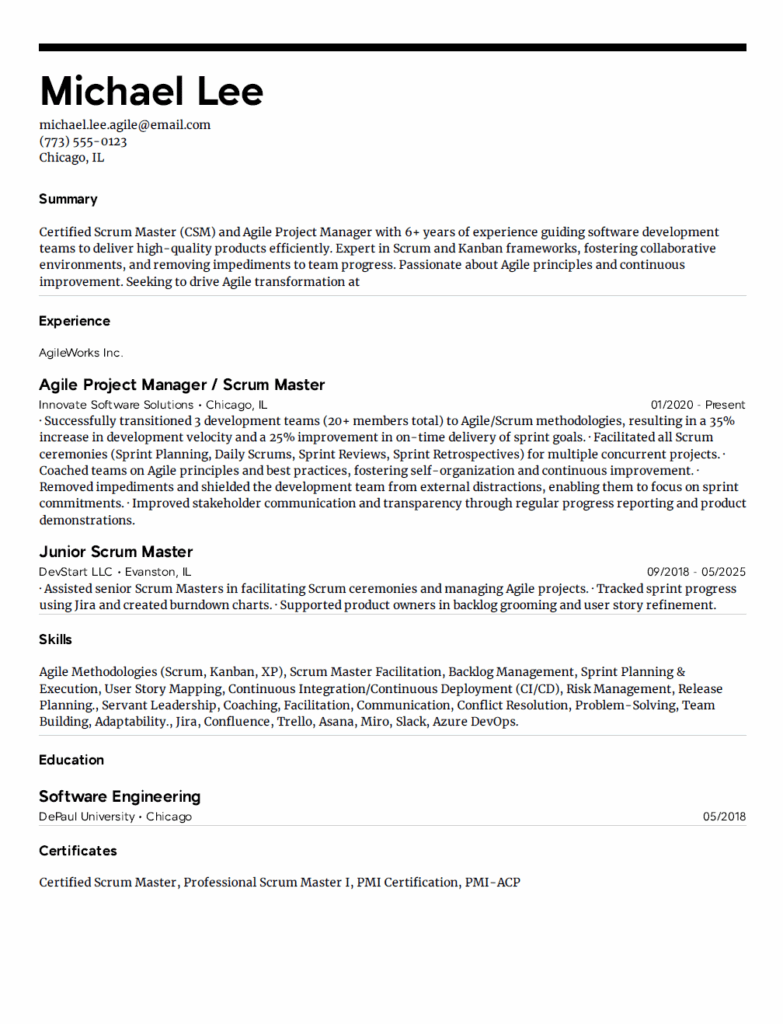
6. Entry-Level Project Coordinator (Aspiring PM)
“Assisted senior project managers in tracking project milestones, preparing status reports, and facilitating meetings for 5 concurrent projects. Colleagues consistently praised me for my attention to detail and proactive communication.” (Emphasizing transferable skills and desire to learn)
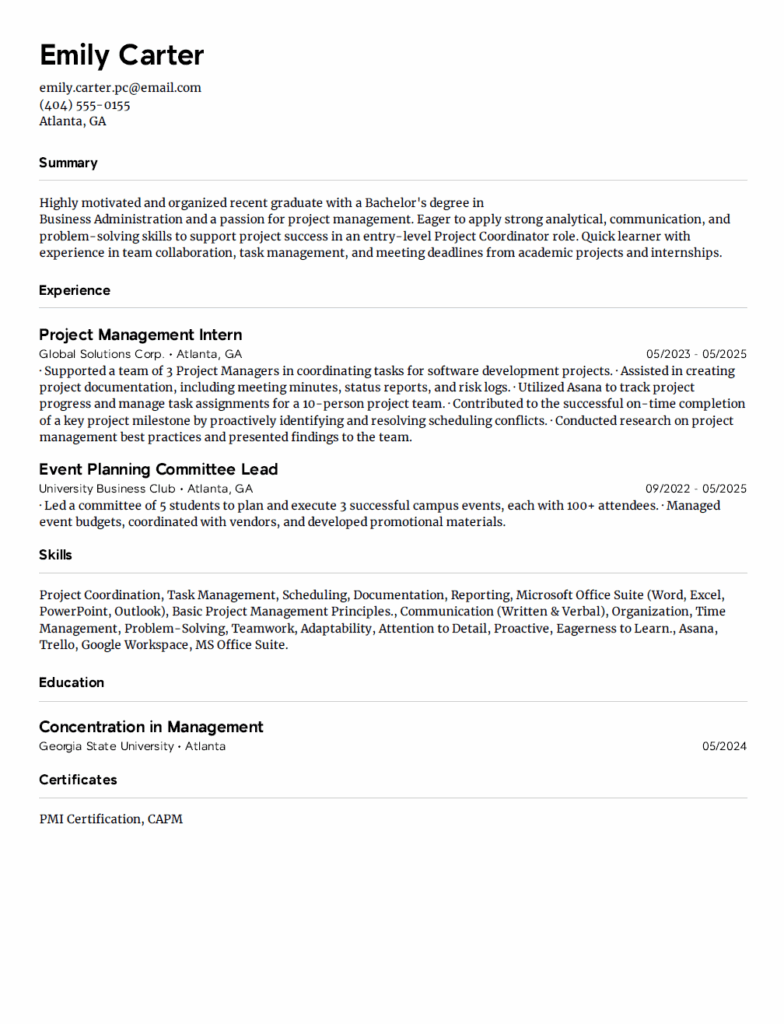
7. Senior Project Manager / program manager
“Managed a very large portfolio of strategic enterprise wide projects worth over $15M. Actively mentored junior project managers and established several standardized project management methodologies that improved overall project success by 12%.”
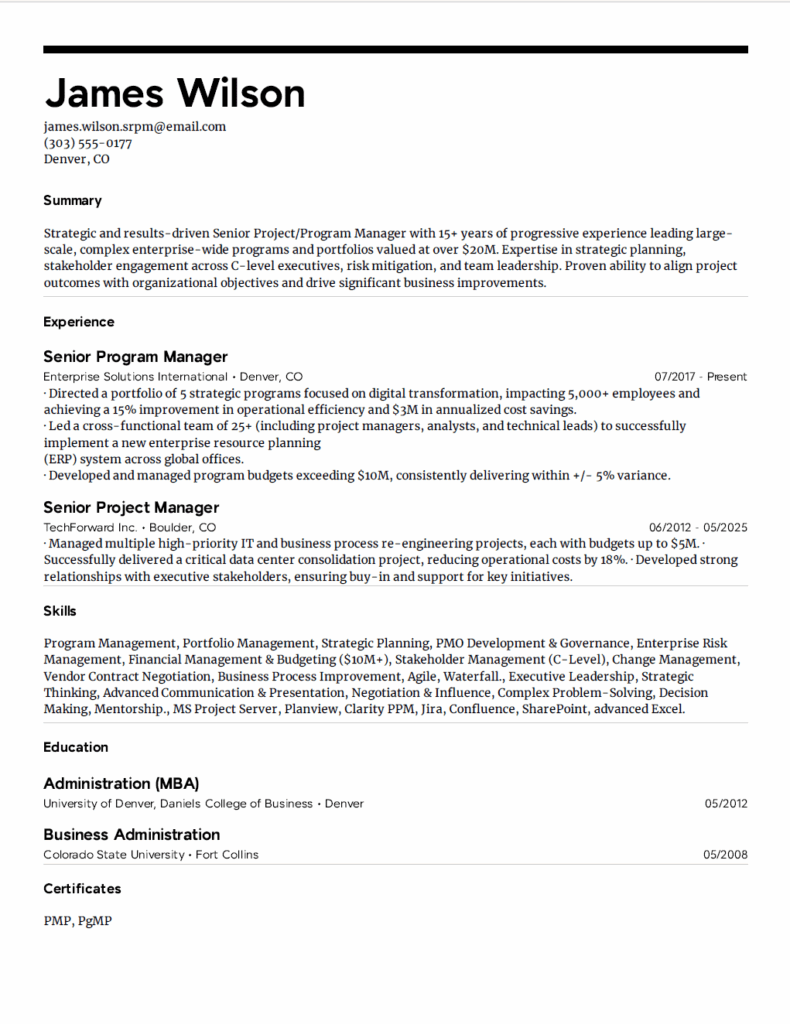
8. Technical Project Manager
“Managed the development and implementation of a new SaaS platform in a technical capacity as the liaison between multiple engineering teams, product owners, and stakeholders, ensuring all technical requirements were met and user stories were implemented correctly to support a successful launch to 10,000+ users.”
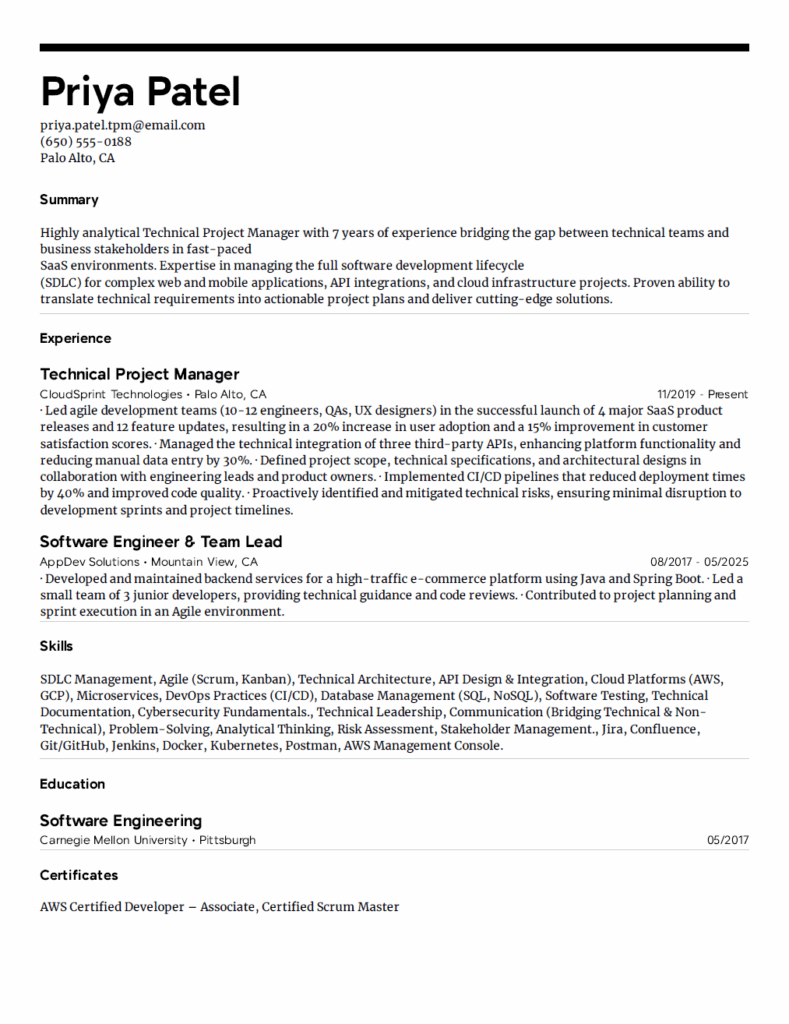
9. Pharmaceutical Project Manager
“Managed two new compound drug development lifecycles, complying with FDA regulations and guiding cross-functional teams through the clinical trial process, which ultimately contributed to one compound successfully completing Phase II.”
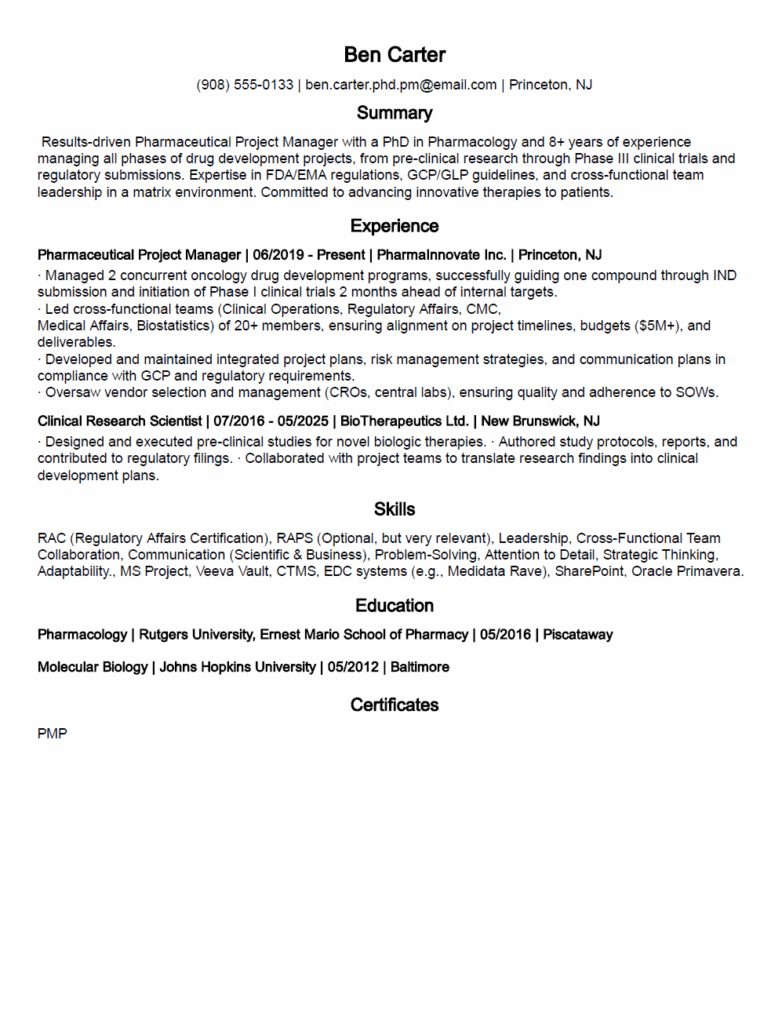
10. Consulting Project Manager
“As the project manager leading client engagements with Fortune 500 companies, I executed complex business transformation projects yielding, on average, 15% operational efficiency and improving client satisfaction scores by 10%.”
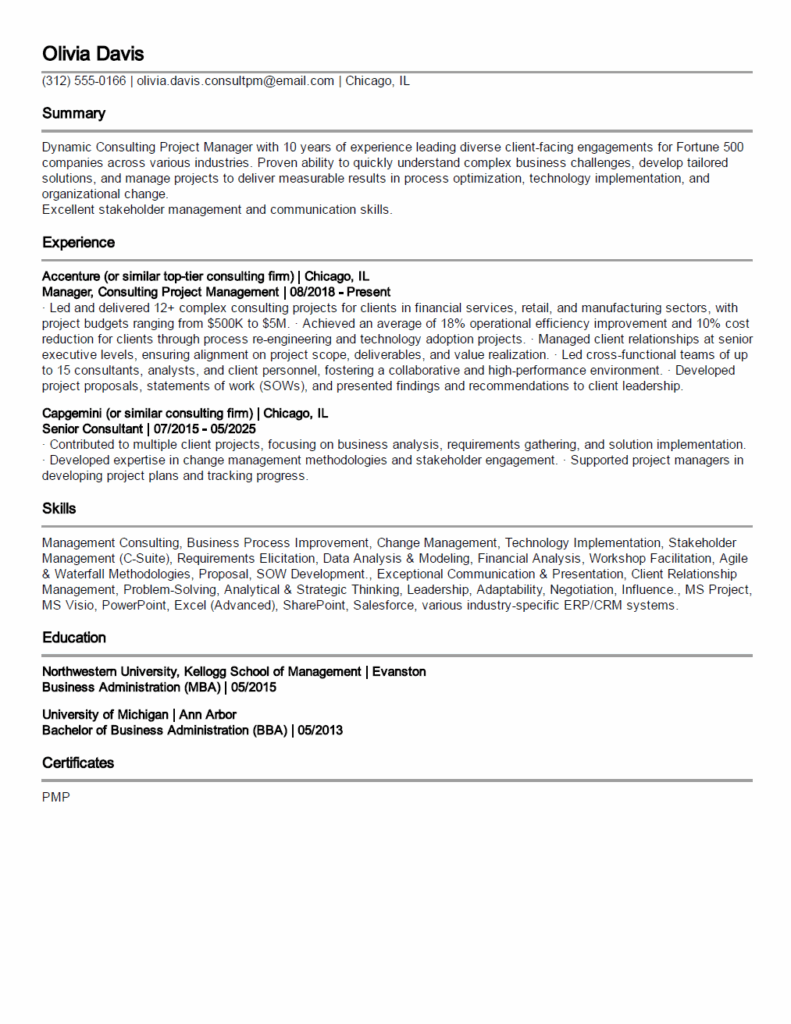
These examples focused on quantifiable outcomes and the project manager’s direct contribution.
Ready to make your achievements pop off the page? Give recruiters a concrete measure of your academic grit—strategically add your standout SAT Score on Resume right now and let it underscore your drive, discipline, and data-backed potential in seconds.
Common Mistakes on Project Manager Resumes (and How to Avoid Them)
Even experienced pros can make errors on their resumes. Here are some common mistakes:
- Typos and grammatical errors: Always proofread thoroughly. Use a grammar checker and take the extra step of having someone review it as well.
- Generic resumes: Not tailoring each resume for the specific position.
- Duty vs. Accomplishments: Listing job duties instead of actual accomplishments, preferably, quantifiable ones.
- Bad/Too Little Formatting: The resume looks unprofessional and difficult to read.
- Exaggerating or lying: Always be honest, and facts can usually be found through background checks.
- Passive language: use strong action verbs.
- Too much irrelevant information: Keep it focused on project management ability.
- Outdated information: Make sure your contact information and recent experience is updated.
By avoiding these errors you will greatly increase the quality of your project manager resume.
Tailoring Your Project Manager Resume for Different Industries
Project management practices are transferrable but the context and realities differ between sectors.
- IT: Clearly emphasize technical skillset, software development lifecycle (SDLC) knowledge, agile/scrum experience, and specific technology.
- Construction: Emphasize having experienced working with building code compliance, safety regulations, contract administration and management of physical resources.
- Healthcare: Emphasize understanding health compliance regulations (e.g. HIPAA), clinical system knowledge, and patient care processes and workflow.
- Marketing: Highlight your creative project management ability, campaign management and other related digital tools as well as being able to work collaboratively with multiple stakeholders.
- Financial institutions: Promote your experience with regulatory compliance, financial systems, and your risk management experience within a financial context, along with your data privacy and security work.
Make sure to research the industry and the specific company where you’re applying for the position and use their language, and highlight the experiences and skills areas that apply specifically to their needs.
Conclusion: project manager resume
Befittingly crafting a project manager resume is an important step in developing your career. With attention to quantifiable accomplishments, relevant project management experience and skills, customizing every resume for each opportunity, and avoiding some all too common mistakes, you can prepare your resume and focusing it so it captures attention.
It is also important to use tools available to you like a Resume checker and to understand the implications of a good Resume Score and What is Resume Parsing? for applicants in the current employment market. Once your resume is tailored and polished, you will have a better chance of increasing your job interviews and getting that next project management job.
FAQ for project manager resume
1. How long should my project manager resume be?
Ideal length would be one page for under 10 years of experience. A maximum of two pages is permitted for excessive experience. Just keep it relevant and impactful.
2. Should I include a photo on my project manager resume?
In most Western customs (USA, the UK) it is usually inadvisable to add a photo to your resume to limit bias. However, custom varies country to country, so do some research if applying externally.
3. What are the most important skills I should list on a project manager resume?
Combination of hard skills (risk management, budget management, Agile methods, project manager software proficiencies) and soft skills (leadership, communications, problem solving, stakeholder management) is most important. See “Key Project Management Skills to Highlight” for a more extensive list.
4. How do I make my project manager resume ATS-friendly?
Use standard fonts and formats, naturally incorporate keywords from the job description, avoid tables and images that may confuse ATS, and submit your resume as a PDF or .docx file as instructed by the employer.
5. Do I need a PMP certification to be hired as a project manager?
A PMP (Project Management Professional) certification is not always required, but it is well-respected and can significantly enhance your C.V., particularly in mid-to-senior level responsibilities. This certification shows you have a standard level of knowledge in project management, and it also indicates a commitment to the profession. Various other certifications, such as PRINCE2 or Agile certifications, may also be beneficial depending on the project management context and industry.



